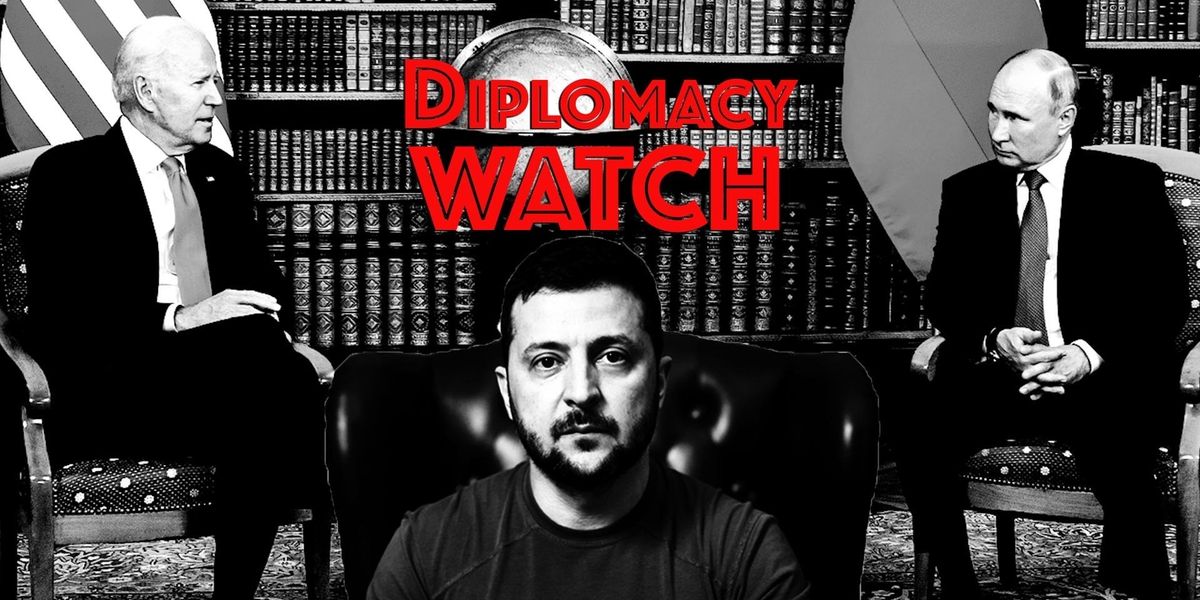Headlines out of Ukraine in recent weeks have been grim. Military officers on the front lines say that the situation in the country’s east is approaching “critical.” The country is facing a serious manpower and weapons shortage. The Russian offensive is reportedly accelerating. Privately, Biden administration officials are wondering whether — even with the latest tranche of U.S. aid secured — Ukraine will be able to win this war.
Listening to Secretary of State Antony Blinken’s speech this week in Kyiv, however, none of this reality was apparent. The tone of Blinken’s speech was optimistic — he referred to the war as a “strategic failure” for Moscow and a “strategic success” for Kyiv. He maintained that Ukraine would win the war and eventually join NATO as a thriving democracy with an economy rebuilt from seized Russian assets.
“All of these measures – Ukraine’s increased integration with, and support from, NATO; a growing network of security agreements with individual countries; a booming defense industrial base – all of these will ensure that the moment conditions are met and Allies agree, Ukraine’s invitation and accession to the Alliance will be swift and smooth,” Blinken said. “These measures will also ensure that if Russia is ever serious about negotiating a truly just and lasting peace with Ukraine, your military prowess will be formidable, your hand strong, your path to Europe and NATO secure.”
As the journalist Leonid Ragozin noted on X, “None of that is on the cards at the moment as the devastated and depopulated country is struggling to prevent a collapse on the frontline.”
The rhetoric is indicative of an administration that has been unwilling to adapt its approach or messaging on the war regardless of changing dynamics. The administration has said that continuing to support Ukraine to improve its battlefield situation will provide Kyiv with a stronger hand at any future negotiations, but has made no indication that such talks are forthcoming and has avoided answering crucial questions about the war’s endgame.
Notably, the speech contained no specific reference to Ukraine’s territorial ambitions. Independent journalist Ken Klippenstein reported on leaked talking points from the secretary’s trip, which included as a trip objective “highlight[ing] U.S. support for a comprehensive, just, and lasting peace” that includes respect for Ukraine’s territorial integrity “within its internationally recognized borders,” which would include Crimea and the Donbas. Blinken’s speech did not mention either of those regions or include “internationally recognized borders.”
In other diplomatic news related to the war in Ukraine:
— During his visit, Blinken also indicated that Washington was open to Ukraine using U.S. weapons to hit targets inside Russia. "We've not enabled or encouraged strikes outside of Ukraine, but ultimately, Ukraine has to make decisions for itself about how it's going to conduct this war," he said. Until now, the Biden administration has reportedly told Ukraine not to strike inside Russia, which has been a point of tension between Washington and Kyiv.
— Russian President Vladimir Putin is traveling to China this week. In advance of his trip, Putin expressed support for China’s peace plan. "We are positive in our assessment of China's approach to solving the Ukrainian crisis," Putin said, according to a translation of a Russian transcript on the Kremlin website. "In Beijing, they truly understand its root causes and its global geopolitical meaning." China has tried to portray itself as a peacemaker in the conflict, and has reportedly been urging Western countries to invite Moscow to upcoming peace summits.
Meanwhile, Ukrainian President Volodymyr Zelensky was set to go to Spain and Portugal this week, but he canceled his plans on Wednesday. No official reason was provided, but media reports suggest that he decided to stay in Ukraine amid the Russian attacks in the country.
— British foreign secretary David Cameron pitched Donald Trump on pursuing a peace deal if he returns to White House in 2025, as part of an effort to convince the former pressident to support aid for Ukraine, according to The Sunday Times.
“Cameron’s message was simple: ‘What are the best conditions in which you as president can make a deal in January? It’s both sides holding their lines and paying a price for that.’ Trump is understood to have responded: ‘No one has set that out for me in these terms. And I’m glad we had the conversation,’” according to the Sunday Times. The suggestion of such a peace proposal would mark a significant shift in the UK’s approach to the war.
Since the report was published, officials have tried to squash speculation that the West was planning to force Kyiv to the negotiating table.
“There is just no sense at all in which Britain would try to persuade, strong-arm or otherwise, Ukraine into accepting giving up some of their territory. That's a decision entirely for Ukraine," defense secretary Grant Shapps told Times Radio on Tuesday.
U.S. State Department news:
In a Tuesday press briefing, State Department spokesman Vedant Patel reiterated the key talking points from Blinken’s speech.
“The Secretary is in Kyiv to reaffirm what President Biden has said, which is that we want Ukraine to win, and we’re committing – committed to helping Ukraine to do just that,” Patel said. “And with the support of the United States, our partners and allies, the Ukrainian people can and will achieve their vision for the future: a free, prosperous, and secure democracy, fully integrated into the Euro-Atlantic community and fully in control of its own destiny.”
- Biden warns of NATO war with Russia if aid disappears ›
- Diplomacy Watch: Did Boris Johnson help stop a peace deal in Ukraine? ›














